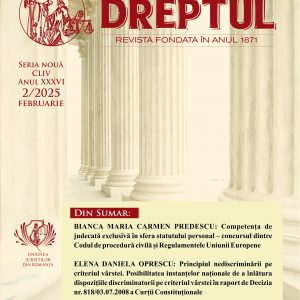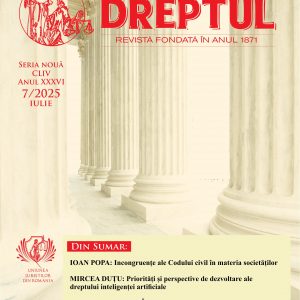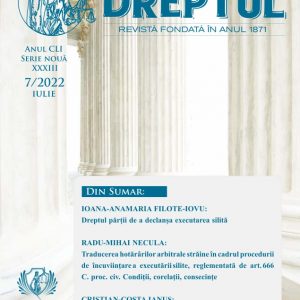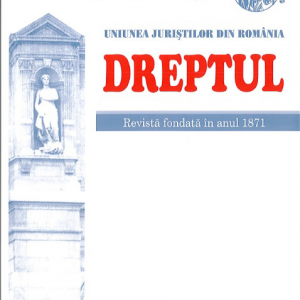-

-

-

-
 This research, analyzing in detail the decisive historical moments for the institution of the notary public, emphasizes the importance of preventing the legal disputes. The authors assume the preference for avoiding a legal dispute as compared to its settlement, keeping and declaring publicly the admiration for the professionals who assist or represent the litigant on the daring and difficult road to „justice”. Briefly passing the medieval period of the presence of the notary public in Transylvania, emphasizing the importance of the papal notary or of the prince’s chancelleries, insisting on the period of formation of Greater Romania and then of the legislative reform imposed after the Great Union, the article identifies the acts and draft normative acts in this matter, which emphasize the usefulness of the profession, the superior professional training of the notary public and the trust that the citizen or the state, regardless of the arrangement, had and still has in the professional notary. The entire research emphasizes new documents, draft normative acts unknown to the general public and it finally defines conclusions, which demonstrate both the permanence of the profession, the role of justice of the peace of the notary public, and his consistent contribution to achieving the „preventive justice”.
This research, analyzing in detail the decisive historical moments for the institution of the notary public, emphasizes the importance of preventing the legal disputes. The authors assume the preference for avoiding a legal dispute as compared to its settlement, keeping and declaring publicly the admiration for the professionals who assist or represent the litigant on the daring and difficult road to „justice”. Briefly passing the medieval period of the presence of the notary public in Transylvania, emphasizing the importance of the papal notary or of the prince’s chancelleries, insisting on the period of formation of Greater Romania and then of the legislative reform imposed after the Great Union, the article identifies the acts and draft normative acts in this matter, which emphasize the usefulness of the profession, the superior professional training of the notary public and the trust that the citizen or the state, regardless of the arrangement, had and still has in the professional notary. The entire research emphasizes new documents, draft normative acts unknown to the general public and it finally defines conclusions, which demonstrate both the permanence of the profession, the role of justice of the peace of the notary public, and his consistent contribution to achieving the „preventive justice”. -
 In the hypothesis of foreign arbitration awards, in order to obtain the approval of the enforcement, pursuant to Article 666 of the Civil Procedure Code, to the application for enforcement, the creditor will have to attach the foreign arbitration award translated by an authorized translator, under the conditions of Article 150 (4) of the Civil Procedure Code, and the final judgment by which it was approved, under the conditions of Article 1127 et seq. of the Civil Procedure Code, the enforcement on the Romanian territory of the respective arbitration award. To the extent that the foreign arbitration award on which the application for enforcement is based is not translated by an authorized translator, the court executor should issue a conclusion refusing to open the enforcement procedure, pursuant to Article 665 (2) of the Civil Procedure Code, for non-fulfilment of this condition provided by law. If, however, the court executor would proceed, in the absence of the submission of the foreign arbitration award translated by an authorized translator, to open the enforcement procedure and would request the approval of the enforcement, we consider that the application for approval of the enforcement should be rejected, pursuant to Article 666 (5) point 2 of the Civil Procedure Code, since, in such a situation, the court executor does not prove, in the incidental legal conditions, the existence of an enforceable title.
In the hypothesis of foreign arbitration awards, in order to obtain the approval of the enforcement, pursuant to Article 666 of the Civil Procedure Code, to the application for enforcement, the creditor will have to attach the foreign arbitration award translated by an authorized translator, under the conditions of Article 150 (4) of the Civil Procedure Code, and the final judgment by which it was approved, under the conditions of Article 1127 et seq. of the Civil Procedure Code, the enforcement on the Romanian territory of the respective arbitration award. To the extent that the foreign arbitration award on which the application for enforcement is based is not translated by an authorized translator, the court executor should issue a conclusion refusing to open the enforcement procedure, pursuant to Article 665 (2) of the Civil Procedure Code, for non-fulfilment of this condition provided by law. If, however, the court executor would proceed, in the absence of the submission of the foreign arbitration award translated by an authorized translator, to open the enforcement procedure and would request the approval of the enforcement, we consider that the application for approval of the enforcement should be rejected, pursuant to Article 666 (5) point 2 of the Civil Procedure Code, since, in such a situation, the court executor does not prove, in the incidental legal conditions, the existence of an enforceable title. -
 Potrivit art. 226 alin. (5) C.pen., plasarea, fără drept, de mijloace tehnice de înregistrare audio sau video, în scopul săvârșirii faptelor prevăzute în alin. (1) și alin. (2), se pedepsește cu închisoarea de la unu la 5 ani. Conform art. 207 alin. (1) C.pen., constrângerea unei persoane să dea, să facă, să nu facă sau să sufere ceva, în scopul de a dobândi în mod injust un folos nepatrimonial, pentru sine ori pentru altul, se pedepsește cu închisoarea de la unu la 5 ani. Potrivit art. 291 alin. (1) C.pen., pretinderea, primirea ori acceptarea promisiunii de bani sau alte foloase, direct sau indirect, pentru sine sau pentru altul, săvârșită de către o persoană care are influență sau lasă să se creadă că are influență asupra unui funcționar public și care promite că îl va determina pe acesta să îndeplinească, să nu îndeplinească, să urgenteze ori să întârzie îndeplinirea unui act ce intră în îndatoririle sale de serviciu sau să îndeplinească un act contrar acestor îndatoriri, se pedepsește cu închisoarea de la 2 la 7 ani (cu notă parțial aprobativă).
Potrivit art. 226 alin. (5) C.pen., plasarea, fără drept, de mijloace tehnice de înregistrare audio sau video, în scopul săvârșirii faptelor prevăzute în alin. (1) și alin. (2), se pedepsește cu închisoarea de la unu la 5 ani. Conform art. 207 alin. (1) C.pen., constrângerea unei persoane să dea, să facă, să nu facă sau să sufere ceva, în scopul de a dobândi în mod injust un folos nepatrimonial, pentru sine ori pentru altul, se pedepsește cu închisoarea de la unu la 5 ani. Potrivit art. 291 alin. (1) C.pen., pretinderea, primirea ori acceptarea promisiunii de bani sau alte foloase, direct sau indirect, pentru sine sau pentru altul, săvârșită de către o persoană care are influență sau lasă să se creadă că are influență asupra unui funcționar public și care promite că îl va determina pe acesta să îndeplinească, să nu îndeplinească, să urgenteze ori să întârzie îndeplinirea unui act ce intră în îndatoririle sale de serviciu sau să îndeplinească un act contrar acestor îndatoriri, se pedepsește cu închisoarea de la 2 la 7 ani (cu notă parțial aprobativă). -
 The present study is an analysis of the theoretical and recent judicial practice occasioned by the offences of trafficking in human beings and by proxenetism. His author has quoted relevant opinions from the specialized doctrine, succeeding in creating a complete picture of the two types of offences, and these elements were doubled by invoking some aspects of the judicial practice in the field. Some of the statements invoked in this study are criticized in an argumentative manner. The manner of conceiving the theme reveals its author’s intention to emphasize also those aspects that confer a comparison content of the offences trafficking in persons and trafficking in minors, on the one hand, and proxenetism respectively, on the other hand. In the course of the analysis, aspects related to other forms of exploitation of the person, as defined in the Criminal Code, were tangentially pointed out as well. At the same time, the article also contains some very pertinent de lege ferenda proposals, based on the good knowledge of the analyzed field.
The present study is an analysis of the theoretical and recent judicial practice occasioned by the offences of trafficking in human beings and by proxenetism. His author has quoted relevant opinions from the specialized doctrine, succeeding in creating a complete picture of the two types of offences, and these elements were doubled by invoking some aspects of the judicial practice in the field. Some of the statements invoked in this study are criticized in an argumentative manner. The manner of conceiving the theme reveals its author’s intention to emphasize also those aspects that confer a comparison content of the offences trafficking in persons and trafficking in minors, on the one hand, and proxenetism respectively, on the other hand. In the course of the analysis, aspects related to other forms of exploitation of the person, as defined in the Criminal Code, were tangentially pointed out as well. At the same time, the article also contains some very pertinent de lege ferenda proposals, based on the good knowledge of the analyzed field. -
 This study proposes to highlight the evolution of the international criminal court, from the establishment of ad-hoc courts, respectively the International Criminal Court for the former Yugoslavia and the International Criminal Court for Rwanda and up to the daily activity of the International Criminal Court, from the perspective of a very sensitive aspect both from the political and judicial point of view: the criminal liability of remarkable leaders, being responsible for the design, management and control of criminal activities committed during the military conflicts and submitted to trial in these courts. In the content of the study, the author points out the legislative and doctrine-related difficulties which the international judicial bodies faced, the judicial formulas that these bodies chose or created in their action of the application of justice, as well as the current and future orientations of the judicial practice of the International Criminal Court.
This study proposes to highlight the evolution of the international criminal court, from the establishment of ad-hoc courts, respectively the International Criminal Court for the former Yugoslavia and the International Criminal Court for Rwanda and up to the daily activity of the International Criminal Court, from the perspective of a very sensitive aspect both from the political and judicial point of view: the criminal liability of remarkable leaders, being responsible for the design, management and control of criminal activities committed during the military conflicts and submitted to trial in these courts. In the content of the study, the author points out the legislative and doctrine-related difficulties which the international judicial bodies faced, the judicial formulas that these bodies chose or created in their action of the application of justice, as well as the current and future orientations of the judicial practice of the International Criminal Court. -
 In ipoteza în care s-a realizat un transfer electronic al unei sume de bani ca urmare a solicitării primite din partea beneficiarului sumei respective, atunci între părți a intervenit un contract de împrumut, restituirea sumei poate fi solicitată doar pe calea unei acțiuni personale întemeiate pe respectivul contract, iar nu pe calea unei acțiuni întemeiate pe îmbogățirea fără justă cauză. (Curtea de Apel București, Secția a III-a civilă și pentru cauze de minori și de familie, Decizia nr. 62 din 26 ianuarie 2021)1 .
In ipoteza în care s-a realizat un transfer electronic al unei sume de bani ca urmare a solicitării primite din partea beneficiarului sumei respective, atunci între părți a intervenit un contract de împrumut, restituirea sumei poate fi solicitată doar pe calea unei acțiuni personale întemeiate pe respectivul contract, iar nu pe calea unei acțiuni întemeiate pe îmbogățirea fără justă cauză. (Curtea de Apel București, Secția a III-a civilă și pentru cauze de minori și de familie, Decizia nr. 62 din 26 ianuarie 2021)1 . -
 Transferul dreptului de proprietate sau legătura contractuală dintre cedent și cesionar nu reprezintă condiții sine qua non pentru existența transferului de întreprindere în accepțiunea Directivei 2001/23/CE astfel cum a fost interpretată prin hotărârile Curții de Justiție a Uniunii Europene și, deși prevăzute de dreptul intern, nu își pot produce efectele în contra scopului directivei, prin restrângerea domeniului de aplicare.
Transferul dreptului de proprietate sau legătura contractuală dintre cedent și cesionar nu reprezintă condiții sine qua non pentru existența transferului de întreprindere în accepțiunea Directivei 2001/23/CE astfel cum a fost interpretată prin hotărârile Curții de Justiție a Uniunii Europene și, deși prevăzute de dreptul intern, nu își pot produce efectele în contra scopului directivei, prin restrângerea domeniului de aplicare. -
 The transfer of procedures in penal law represents a form of international judiciary cooperation, which entails the voluntary and provisional waiver by a State of its exercise of its own penal jurisdiction in favor of another State. The authors’ approach targets the determination of the legal treatment of the transfer of procedures in penal law, with a special reference to the procedural acts entailed by the delivery and takeover of penal procedures, as basic forms of such institution, as well as of its legal effects.
The transfer of procedures in penal law represents a form of international judiciary cooperation, which entails the voluntary and provisional waiver by a State of its exercise of its own penal jurisdiction in favor of another State. The authors’ approach targets the determination of the legal treatment of the transfer of procedures in penal law, with a special reference to the procedural acts entailed by the delivery and takeover of penal procedures, as basic forms of such institution, as well as of its legal effects. -
 The choice made by the Romanian pouvoir constituant in 1991 in favour of the European model of constitutional review does not seem to have been followed by legal terminology. Most probably in order not to break with a tradition that still enjoys good reputation among legal scholars and practitioners, the label of „exception of unconstitutionality” has been preferred to the one of „preliminary reference”. This apparently minor semantic detail managed to have a lasting impact on the admissibility of this procedure to the point where the very legal institution has been completely transfigured: from a preliminary question it has become a defensive procedural tool.
The choice made by the Romanian pouvoir constituant in 1991 in favour of the European model of constitutional review does not seem to have been followed by legal terminology. Most probably in order not to break with a tradition that still enjoys good reputation among legal scholars and practitioners, the label of „exception of unconstitutionality” has been preferred to the one of „preliminary reference”. This apparently minor semantic detail managed to have a lasting impact on the admissibility of this procedure to the point where the very legal institution has been completely transfigured: from a preliminary question it has become a defensive procedural tool.
